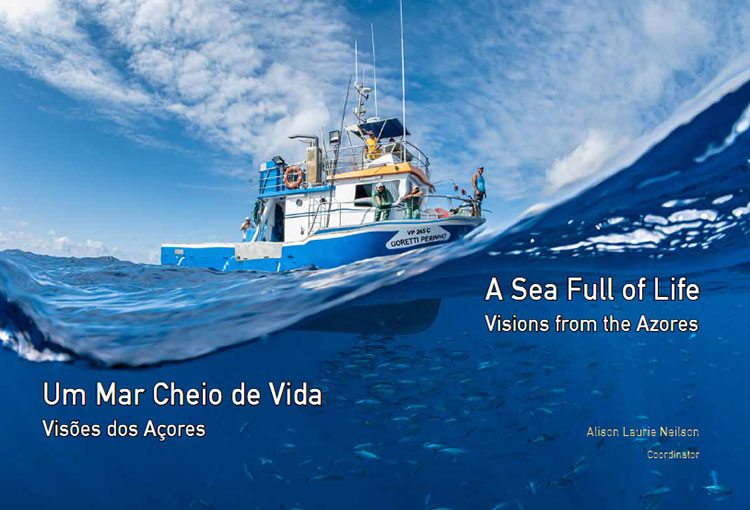Seminar
Azores and the International Year of Small-scale Fishing and Aquaculture | Includes launch of book "Um mar cheio de vida: Visões dos Açores"
Alison Neilson
João Afonso Baptista
João Paulo Quinzico Delgado
Mónica Mesquita
May 19, 2022, 19h00
Casa dos Açores Rua dos Navegantes, nº 21 (Lisbon)
About
What is the "ocean"? Who speaks for the ocean? How do we hear the ocean? What is blue justice? Speakers will share insights from social sciences and fishing communities.
The programme includes the presentation of a new book of photographic narratives of the Azores islands created in collaboration with people from the nine islands.
Programme
Fishing communities in resistance mode
João Delgada, Mútua dos Pescadores and CES Centre for Social Studies
Marine Social Sciences. When transdiciplinarity enters the academy
Mónica Mesquita, Sea Science, Technology and Society (MSTS) at NOVA School of Science and Technology
The construction of the ocean
João Baptista, Institute of Social Sciences, University of Lisbon (ICS-ULisboa)
Collaborations between researchers, fishermen and associations
Alison Laurie Neilson, CICS.NOVA Interdisciplinary Centre of Social Sciences, NOVA University of Lisbon and CES Centre for Social Studies
Bio notes
João Paulo Quinzico Delgado
Degree in Sculpture by ESAD.CR (Higher School of Art and Design of Caldas da Rainha); Postgraduate degree in Social Economics by FEUC (Faculty of Economics of the University of Coimbra); PhD student in Sociology - Labour Relations, Social Inequalities and Trade Unionism at FEUC. Fisherman and master of local and coastal fishing vessels between 2004 and 2016. Trainer at For-Mar since 2009. President of the Board of the Mútua dos Pescadores since March 2021
Monica Mesquita
Ph.D. in Education Sciences with specialization in Community Education and in Socioanthropology of Space. Postdoctoral degree in Education Sciences - Political Philosophy in Education, and in Environmental Sciences - Ocean Literacy and Resilient Communities. Researcher at NOVA University of Lisbon, she integrates the MARE Centre since 2016, in which she coordinates the Ocean Literacy Observatory. With experience in project coordination, today she leads the national research of the Smart Fishing Project - safety and sustainability in local fisheries, the international research of an Erasmus + project identified as Partibridges - public participation of young fishermen in local decision-making and the Marine Science, Technology, and Society research fostered by EEA Grants. With national and international teaching and guidance experience in community education, ocean literacy, autonomy pedagogy, intellectual and environmental justice, systemic complexity, transdisciplinary and transcultural education, she works with the bottom-up methodology Critical Ethnography to foster the intellectual collaboration of all the actors in an investigation aiming at a full exercise of citizen science.
João Afonso Baptista
Sou um antropólogo interdisciplinar. Trabalho sobretudo em áreas onde a tecnociência, o direito, a moralidade, e a produção de conhecimento se misturam de tal forma que as diferenças entre estes campos são suspensas. Lecionei em várias universidades e institutos em África e na Europa, e desenvolvi trabalho de campo prolongado em Angola, Moçambique e Portugal. Em geral, parte do meu trabalho centra-se em questões conceptuais, enquanto outra parte contém dimensões “aplicadas”. Tenho promovido e beneficiado de colaborações com parceiros não académicos. Atualmente desenvolvo investigação para o projeto “‘Portugal is Sea’: Anthropological and Ethnographic engagements with ‘the Natural’” (www.portugal-is-sea.org).
Alison Laurie Neilson
CICS.NOVA Centro Interdisciplinar de Ciências Sociais, NOVA Universidade de Lisboa e CES Centro de Estudos Sociais. Investigadora interdisciplinar, que transcende as fronteiras entre artes/ciências, académica/não académica e pesquisadora/pesquisada em criação de conhecimento e governança da pesca. Trabalha em questões de justiça ambiental em comunidades pesqueiras de pequena escala das Ilhas dos Açores, Portugal. Conduz pesquisas narrativas e informadas sobre as artes sobre como a sustentabilidade é entendida e usada na política de educação e pesca. Analisa a maneira como o conhecimento, a sabedoria e a política se misturam. É também uma facilitadora e formadora de professores acreditada.


